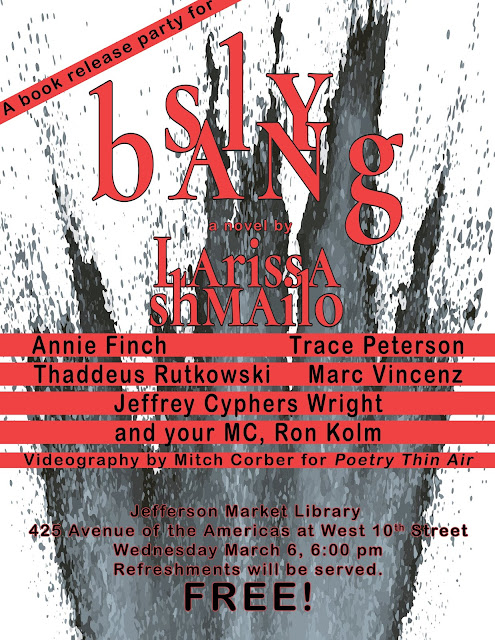Read Charles Rammelkamp's review of Sly Bang, which appears in the current issue of edgy print journal Into the Void.
Sly Bang by Larissa Shmailo
Reviewed by Charles
Rammelkamp
“Sly Bang”
Novel
Spuyten Duyvil, 2019
$18.00, 198 pages
ISBN: 978-1-947980-98-3
Larissa Shmailo’s novel feels like
a mash-up of William Burroughs’s paranoid mind-control fantasies and the
kaleidoscopic space fantasies of superhero comic books. Indeed, the “sly bang”
in the title alludes to the plot to destroy the universe by the – mad
scientist? sui generis bad guy? – Prince Eugene (Genya) Ouspensky that the
protagonist, Nora (as in Ibsen’s Doll House), aka, Larissa Ekaterina Anastasia
Nikolayenvna Romanova, is determined to thwart. But this is not a traditional
what-happens-next narrative, though by the end it does “feel” like a resolution
has been reached.
But people die and come back to
life all over the place, so who can tell, and we are often treated to
flashbacks to World War II era concentration camps and Soviet gulags. Ouspensky
pursues Nora/Larissa through the whole strange space-time warp of this
science-ficitiony world. Ouspensky can read Nora’s mind, trying to control her.
But “Larissa artfully dodges sex with Ouspensky by role-playing Anna and
Vronsky, Lara and Zhivago, and he enjoys this.” Nora is an FBI agent (not
necessarily a good thing, more sinister than salubrious) with telepathic, comic
book superhero powers of her own.
Speaking of “sly,” Shmailo often
makes these amusing, satirical references to the cornerstones of western
civilization, from Heidegger and Nietzsche and Tolstoy to John Lennon and Patti
Smith. “Hillary Clinton lay on the table wriggling, bound and gagged.” Johnny
Depp provides occasional voiceover.
Shmailo uses a variety of literary
forms in the construction of her novel. The book opens up, stage drama-like,
with stage direction and setting and off-stage voices, as we encounter Nora
masturbating on a leather couch. As in a
play, the dialogue is written:
MICHAEL: Hey there!
NORA: Hello, Michael, are there
walls between us, buildings, I hope?
MICHAEL: Yes, and I’ve
triple-locked the door and bound my feet…
The writing then moves to a more
conventional style of an omniscient narrator voice moving the story along. But
don’t get used to any particular style! Shmailo seems to be having fun
subverting readers’ expectations.
For just as easily, Shmailo will
burst out into poetry, including sublime lyrics like HOW MY FAMILY SURVIVED THE
CAMPS, Nora’s poem.
Was micht nicht umbringt, macht mich
starker:
What does not kill me makes me stronger.
Nietzsche
said this about other things.
Not
this.
How
did my family survive the camps?
Were
they smarter, stronger than the rest?
Were
they lucky?
Did
luck exist in Dora-Nordhausen,
Auschwitz
and Bergen-Belsen?
This comes from an episode
involving Nora’s mother, Leda, in which we read in Nora’s backstory,
reminiscent of the “origin story” of so many comic book superheroes. Leda, we
learn, conceives Nora in the Brooklyn neighborhood of Williamsburg in 1946
“with the last sex she will ever have.” Of course, Leda’s resentment about this
is a factor later on.
But it’s best not to give away the
plot, spoiler-like, especially as the plot, like a dream, is subject to the
interpretation of every reader, which may be the ultimate point of Shmailo’s
satire. Still, after so much gore and
blood and guts and sexual perversity, it’s hard not to smile at the fairy tale
ending when the character Bensinck “dropped to one knee and took her hand” like
Prince Charming swooning over Cinderella. Dim the lights. Shine a soft spot on the
dude. With what seems the sincerity only an earnest fairy tale prince can
display, he says to her, “No more undercover, no more faking it. Just us, and a
quarter of the world’s land mass.” Hah!
And Nora, God bless her, having
just a moment before read through a story she’s written about killing Ouspensky
after he has an orgasm inside her (“ He
starts fucking her with his tiny dick and Nora starts fantasizing about killing
him and it turns her on.”), smiles sweetly and responds: “And create a
world safe for our children, Albert? Or am I going too fast for you?”
But wait, that’s not all! The
story is followed by APPENDIX; NORA’S SLAA SEXUAL HARMS INVENTORY (FRAGMENT).
Her sexual ideal? “I have sex with a man
whom I love and respect and trust and am attracted to and who loves and
respects and trusts me and is attracted to me as part of a committed
relationship and as a byproduct of sharing and partnership. Our sex is
creative, playful, imaginative and hot. [following pages illegible]” There follows a series of fragments about
various men and her “reasons for getting involved.”
Do you get the uncomfortable
feeling that Shmailo is playing the reader, having us on? It’s this discomfort
that’s finally at the heart of the writing, masterful satire whose object is
constantly shifting and, yes, may be you.
You just have to read Sly Bang yourself
and come to your own conclusions. You
won’t regret it.
Charles
Rammelkamp




